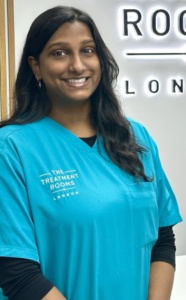By Dr Puroshini Pather – Hair Transplant Surgeon at Treatment Rooms London.
There is no one-size-fits-all approach to keeping our hair healthy. Hair growth cycles, textures, colours and lifestyles vary from individual to individual, and the health of our hair relies on factors like genetics, hormonal imbalances, nutrition and stress.
While many of these factors require consultation with a specialist, your diet is one aspect that can be personally altered. A balanced diet is key for all bodily functions, but there are certain foods that are particularly good for hair health.

Here are four key ways to stay on top of your diet, and ensure more luscious locks.
1. Up your protein levels
Hair is primarily made up of keratin, a protein vital for providing structure to hair strands. Keratin-rich foods like lean meats, poultry, and fish are all essential for this – oily fish (such as salmon, herring and mackerel) additionally have omega-3 fatty acids, which help nourish and hydrate the skin, hair and scalp.
Eggs are also high in protein and biotin, which support keratin production. The fats in egg yolks are rich in vitamin D, which aid the hair growth cycle and prevent dryness and breakage.
And for any vegan or vegetarian requirements, almonds, flaxseeds and sunflower seeds can be great alternatives. Tofu or tempeh marinated in flaxseed oil can help feed your hair growth, especially when paired with a nutritious salad base.

2. Get your five a day
Pair your protein with some fruit and veg for balance, variety and added nutritional benefits. Berries are rich in vitamins and antioxidants, helping to boost scalp health and hair strength. Leafy greens like spinach and kale are filled with vitamin A for moisturising the scalp, and citrus fruits like oranges and grapefruits contain high amounts of folic acid, which is vital for new cell creation and hair growth.
Strawberries, bell peppers and tomatoes are also essential as they’re packed with vitamin C, which enhances iron absorption and collagen production, providing both nutritional and structural support to hair follicles.

3. Choose the right supplements
A balanced diet can provide your hair with the vitamins and minerals it needs; however oral supplements can also be taken to combat any deficiencies. It is important to consult with a healthcare professional before supplementing, as excessive amounts of vitamins and minerals can lead to adverse side effects and do both you and your hair more harm than good.
A molecule especially relevant to the British population is Vitamin D. With long winters, rainy spells and grey skies, the lack of sunlight commonly leads to Vitamin D deficiency. Vitamin D is crucial for healthy hair formation, and so supplementing this during the winter and spring months can help support the immune system and hair growth cycle.
Simple bloods tests with your local family GP can help to determine whether supplementation of any vitamin or mineral is right for you, and at the correct doses.

4. Manage weight loss effectively
Rapid weight loss can be life-changing in many ways, affecting our metabolisms, as well as how our body’s internal clocks run.
When we restrict our calories, nutrients are diverted towards major organs as the body prioritises more essential functions. This can impact hair health, leading to a condition known as telogen effluvium, a temporary hair loss condition caused by stressful events on either the body or mind. Stressful events can include psychological stress, hormonal shifts, dietary changes and medical conditions.
To prevent hair loss, and promote healthy hair growth, gradually changing eating habits and prioritising balance is the way to go.

When nutrition isn’t helping…
If you have been following a balanced lifestyle and still show signs of hair thinning, there may be underlying causes at play. Speak with your family physician or local healthcare professional to investigate further causes of hair loss. Blood tests, scans and clinical assessment are all important in determining the root cause.
At The Treatment Rooms London, we pride ourselves on holistic, patient-centred care. If you are looking for a more permanent solution to your hair loss concerns, get in touch with our expert team for more comprehensive advice.
About the expert
 Dr Puroshini Pather is a Hair Transplant Surgeon at Treatment Rooms London, making waves as one of the youngest female surgeons in a male-dominated industry. From her background in General Medicine and Surgery, Puroshini moved over to the field of hair transplants, and she’s now an Affiliate Medical Member of the British Association of Hair Restoration Surgery. She uses her position in the clinic to advocate for mental wellbeing, emphasising holistic, patient-centred care.
Dr Puroshini Pather is a Hair Transplant Surgeon at Treatment Rooms London, making waves as one of the youngest female surgeons in a male-dominated industry. From her background in General Medicine and Surgery, Puroshini moved over to the field of hair transplants, and she’s now an Affiliate Medical Member of the British Association of Hair Restoration Surgery. She uses her position in the clinic to advocate for mental wellbeing, emphasising holistic, patient-centred care.


